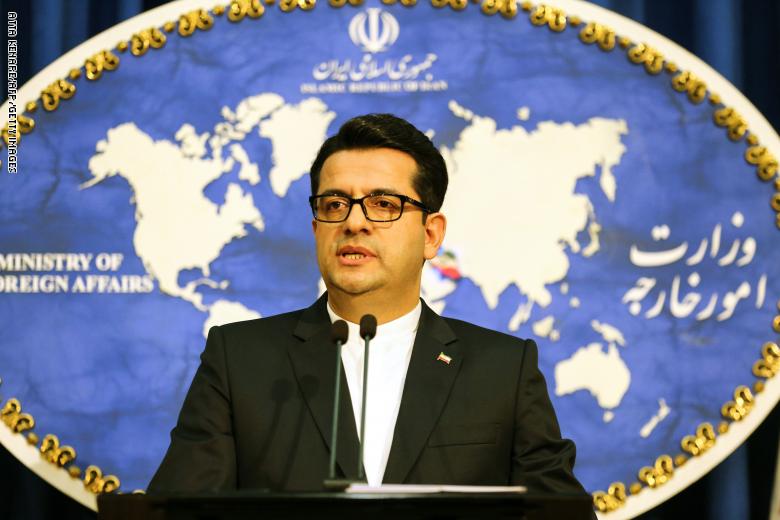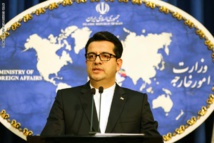"The useless US sanctions against the Iranian leader and our diplomatic commander (Zarif) have ultimately closed the path for a diplomatic option," Foreign Ministry spokesman Abbas Mousavi wrote on Twitter.
US President Donald Trump on Monday signed an executive order imposing what he called "hard-hitting" new sanctions.
Trump said the United States will continue to increase pressure on Tehran, adding that Washington has shown a lot of restraint thus far, "but that doesn't mean we're going to show it in the future."
Mousavi charged that the Trump administration is destroying all internationally recognized mechanisms for peace and security in the world.
The fresh US sanctions come after "a series of aggressive behaviours by the Iranian regime in recent weeks," Trump said. This includes Iran's downing of a US military spy drone.
The expanded sanctions are meant to deny Iran access to financial instruments, specifically targeting the supreme leader's office to "lock up literally billions more in assets," according to US Treasury Secretary Steven Mnuchin.
Sanctions are part of the US "maximum pressure" campaign demanding stricter oversight of its nuclear programme and a reshaping of its foreign policy with regard to its support for groups in Syria and Yemen.
Mnuchin said some of the new sanctions were in the works prior to the downing of the drone on Thursday.
"These sanctions are all very important for recent activities," Mnuchin told reporters at the White House Monday, adding that Trump has authorized him to impose sanctions on Zarif soon.
Mnuchin also said the new sanctions would cut off funds to the Islamic Revolutionary Guard Corps (IRGC). He declined to comment on specific intelligence about the movement of funds.
Prior to signing the executive order at the White House, Trump said the US doesn't seek conflict with Iran, but emphasized that Iran cannot have a nuclear weapon.
In New York, the United Nations Security Council on Monday called for "maximum restraint" and for action to reduce escalation and end tensions in the Gulf.
The council also condemned the attacks on oil tankers in the Strait of Hormuz earlier this month, calling them a "serious threat to maritime navigation." The US blames Iran for the attacks, but Tehran denies responsibility.
The 15-member council called for differences to be addressed peacefully and through dialogue.
But Iran's UN ambassador said the atmosphere was not right for dialogue to happen between Tehran and Washington.
"How can you start a dialogue with somebody whose primary preoccupation is to put more sanctions on Iran?" Majid Takht-Ravanchi said, in remarks in New York.
Over the weekend Trump stopped short of launching airstrikes on Iranian targets in response to the downing of the drone. He then dispatched US Secretary of State Mike Pompeo to the region on a diplomatic mission.
Pompeo told reporters prior to departing that the US was seeking "a global coalition" prepared to push back against what he called "the world's largest state sponsor of terror." Iran has dismissed the idea of a global coalition.
There are growing concerns that Tehran and Washington could make miscalculations in their recent brinkmanship, with potentially dire consequences as neither country will want to appear to be backing down.
Washington has blamed Iran for the attacks on the tankers and sent more troops and military assets to the region to back up its substantial forces already based in Arab Gulf monarchies.
Iran denies involvement in the oil tanker attacks and says the drone was in its airspace. The US maintains that it was in international waters.
Tensions between the US and Iran have risen steadily since the US withdrew last year from an international deal designed to prevent Iran from developing nuclear weapon.
Iranian President Hassan Rowhani has called the US sanctions the "equivalent of economic terrorism" and said the US withdrawal from the nuclear deal stood at "the root" of the current regional and international conflict.
US President Donald Trump on Monday signed an executive order imposing what he called "hard-hitting" new sanctions.
Trump said the United States will continue to increase pressure on Tehran, adding that Washington has shown a lot of restraint thus far, "but that doesn't mean we're going to show it in the future."
Mousavi charged that the Trump administration is destroying all internationally recognized mechanisms for peace and security in the world.
The fresh US sanctions come after "a series of aggressive behaviours by the Iranian regime in recent weeks," Trump said. This includes Iran's downing of a US military spy drone.
The expanded sanctions are meant to deny Iran access to financial instruments, specifically targeting the supreme leader's office to "lock up literally billions more in assets," according to US Treasury Secretary Steven Mnuchin.
Sanctions are part of the US "maximum pressure" campaign demanding stricter oversight of its nuclear programme and a reshaping of its foreign policy with regard to its support for groups in Syria and Yemen.
Mnuchin said some of the new sanctions were in the works prior to the downing of the drone on Thursday.
"These sanctions are all very important for recent activities," Mnuchin told reporters at the White House Monday, adding that Trump has authorized him to impose sanctions on Zarif soon.
Mnuchin also said the new sanctions would cut off funds to the Islamic Revolutionary Guard Corps (IRGC). He declined to comment on specific intelligence about the movement of funds.
Prior to signing the executive order at the White House, Trump said the US doesn't seek conflict with Iran, but emphasized that Iran cannot have a nuclear weapon.
In New York, the United Nations Security Council on Monday called for "maximum restraint" and for action to reduce escalation and end tensions in the Gulf.
The council also condemned the attacks on oil tankers in the Strait of Hormuz earlier this month, calling them a "serious threat to maritime navigation." The US blames Iran for the attacks, but Tehran denies responsibility.
The 15-member council called for differences to be addressed peacefully and through dialogue.
But Iran's UN ambassador said the atmosphere was not right for dialogue to happen between Tehran and Washington.
"How can you start a dialogue with somebody whose primary preoccupation is to put more sanctions on Iran?" Majid Takht-Ravanchi said, in remarks in New York.
Over the weekend Trump stopped short of launching airstrikes on Iranian targets in response to the downing of the drone. He then dispatched US Secretary of State Mike Pompeo to the region on a diplomatic mission.
Pompeo told reporters prior to departing that the US was seeking "a global coalition" prepared to push back against what he called "the world's largest state sponsor of terror." Iran has dismissed the idea of a global coalition.
There are growing concerns that Tehran and Washington could make miscalculations in their recent brinkmanship, with potentially dire consequences as neither country will want to appear to be backing down.
Washington has blamed Iran for the attacks on the tankers and sent more troops and military assets to the region to back up its substantial forces already based in Arab Gulf monarchies.
Iran denies involvement in the oil tanker attacks and says the drone was in its airspace. The US maintains that it was in international waters.
Tensions between the US and Iran have risen steadily since the US withdrew last year from an international deal designed to prevent Iran from developing nuclear weapon.
Iranian President Hassan Rowhani has called the US sanctions the "equivalent of economic terrorism" and said the US withdrawal from the nuclear deal stood at "the root" of the current regional and international conflict.









 Home
Home Politics
Politics











